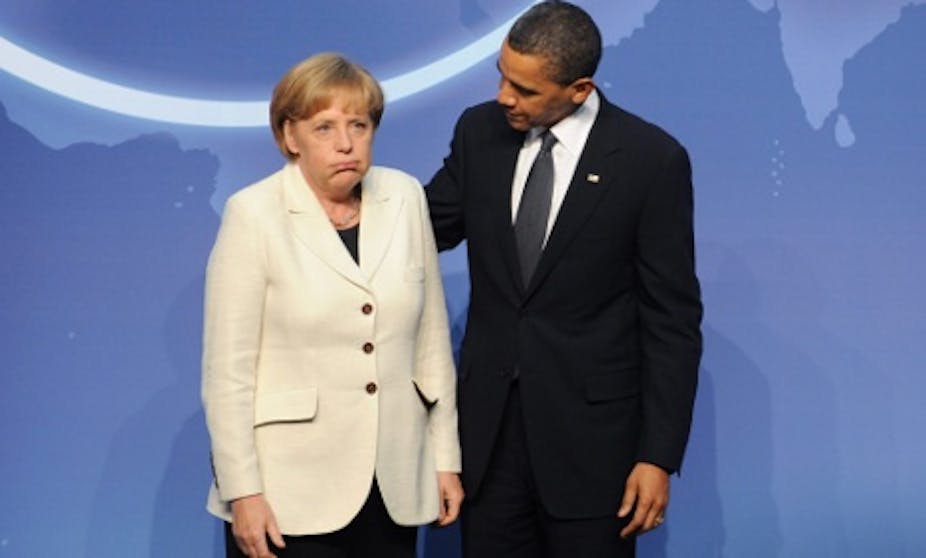Revelations about the extent of the American National Security Agency’s (NSA’s) global communications surveillance have raised considerable media and political attention. The fact that the NSA not only bugs the phones of drug kingpins and reads the e-mails of al-Qaeda members, but also targets so-called “friendly” states, such as Germany, Brazil and France, has had a significant impact on the current discussion. Der Spiegel’s allegations that even the mobile of the German chancellor, Angela Merkel was not safe from American spying efforts were widely seen as scandalous. As Robert Roßmann in the Süddeutsche Zeitung wrote: “(a) greater affront by a friendly state is hardly conceivable”.
For scholars and practitioners of intelligence the news is much less surprising, though. The former director of France’s domestic intelligence agency DCRI, Bernard Squarcini, stated in an interview with Le Figaro that “there is no reason to be surprised” as allies have been spying on each other for a long time. And he is right, of course. The history of intelligence provides examples of occasional friend-on-friend spying. The point of gathering information about foreign governments and countries is to establish an informational picture which is as accurate as possible and helps to make good political decisions.
Everybody’s doing it…
The uncomfortable truth for those being outraged by the #Merkelphone revelations is that no government wants to be blind with respect to any other country or region in this interdependent world. As John McLaughlin, former acting director of the Central Intelligence Agency (CIA), said earlier this week: “All governments collect information on nearly all governments.” This includes material gained from intercepting foreign communications data through Signals Intelligence (SIGINT) institutions, such as the NSA and the British Government Communications Headquarters (GCHQ). However, spying among friends is an ethical grey area and a taboo topic. It can cause great embarrassment, if revealed.
What has been truly remarkable about the revelations on the basis of leaked information provided by former private intelligence contractor Edward Snowden is that it allows the public to get some sense of the scope and detail of surveillance operations conducted by Western SIGINT services. And the picture is daunting. SIGINT agencies have been traditionally working under a cloak of secrecy. The long-standing UKUSA agreement which now provides for SIGINT cooperation among the “Five Eyes” – the UK, the US, Canada, Australia and New Zealand – requires the members not to reveal the existence of the agreement to any outsiders.

Despite efforts by some investigative journalists and academics, SIGINT is still one of the least understood dimensions of the intelligence realm. Some of the material provided by Snowden indicates the existence of an emerging close-knit network of global surveillance. As Der Spiegel stated in July:
Britain’s GCHQ intelligence agency can spy on anyone but British nationals, the NSA can conduct surveillance on anyone but Americans, and Germany’s BND foreign intelligence agency can spy on anyone but Germans. That’s how a matrix is created of boundless surveillance in which each partner aids the others in a division of roles.
The realisation of this width and depth of SIGINT surveillance and the apparent lack of a clear ethical or legal framework for this global matrix unnerves many people. A drastic solution for Merkel and, in fact, all of us would be to follow the example of the Indian prime minister, Manmohan Singh, who reportedly does not use a mobile phone or e-mail. That, however, does not seem to be a plausible solution for obvious reasons.
Enough is enough
While it is too early to determine the impact of the recent revelations, a few short-term repercussions can be discussed. Merkel’s administration was pretty successful this summer in its attempt to marginalise any debate in Germany about the Snowden revelations and possible involvement of German authorities. Yet she now appears to be very angry , requesting an explanation from Barack Obama and summoning the US ambassador. On Monday, the French president, François Hollande, reacted similarly after reports that the NSA collected up to 70m digital communications of French citizens in just one month last winter. Both heads of government expressed their anger publicly and warned that broken trust might jeopardise intelligence sharing in the future.
Other European governments and EU institutions appear to be similarly offended by the revelations. Arguably, the sharp response has also to do with Obama’s image. Originally seen as the president who would “soften” the American approach to counter-terrorism after taking over from George W Bush, his failure to close Guantánamo Bay, the lack of investigations into the extraordinary rendition programme and the harsh pursuit of whistleblowers within the US government disappointed many Europeans. Together with a general sense that Obama is simply not interested in Europe, the alleged “disrespect” that Obama has shown when allowing the NSA to spy on his European counterparts has now severely cooled the transatlantic relationship. Falling out of love is a painful process, and the Europeans are feeling insulted. “(E)nough is enough”, as Michel Barnier, the EU’s internal market commissioner, told the BBC.
So, where will the Europeans go from here? On the first day of an EU Summit, the participants expressed their “deep concern” about the recent revelations. While it seems unlikely that the current dispute will jeopardise the ongoing negotiations about a free trade deal between Europe and the US, which Brussels and the European governments consider to be very profitable, one area in which the revelations can be expected to have a more long-lasting effect is that of data protection. Snowden’s revelations have already revived negotiations about a strengthened EU-wide data protection regulation.
Concerning transatlantic intelligence gathering, Germany and France will shortly approach the US, aiming for mutual “understanding”. The European parliament can also further flex its muscles in this context as it did earlier this week when it suspended the US-EU SWIFT Agreement, aimed at facilitating the fight against terrorist financing, due to data protection concerns. Similar actions could be taken again.

